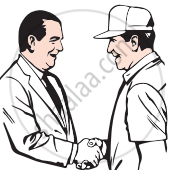Advertisements
Chapters
▶ 1.2: Once Upon a Time
1.3: After Twenty Years
2.1: The Queen of Boxing
2.2: Confessions of a Born Spectator
2.3: A Shot in the Dark
3.1: Forgetting
3.2: Lines Written in the Early Spring
3.3: The First Patient (play)
4.1: Tight Corners
4.2: Macavity - The Mystery Cat
4.3: With the Photographer
5.1: The Convocation Address
5.2: Everest is not the Only Peak
5.3: The Singing Lesson
6.1: The Accidental Tourist
6.2: The Hollow Crown
6.3: Never Never Nest (Play)

Advertisements
Solutions for Chapter 1.2: Once Upon a Time
Below listed, you can find solutions for Chapter 1.2 of Tamil Nadu Board of Secondary Education Samacheer Kalvi for English Class 11 TN Board.
Samacheer Kalvi solutions for English Class 11 TN Board 1.2 Once Upon a Time Warm Up [Page 20]
Guess what friendly words these two gentlemen exchange when shaking hands.

The children in the picture are watching an exciting sporting event, where their school team is winning. Suggest suitable utterances reflecting their feelings:

Given a chance, any adult would wish to become a child again for many reasons. Fill the boxes with some of what you imagine could be the reasons.
| e.g. I need not worry about project deadlines. | |||
| I can wear my pajamas the whole day. | |||
| I can sleep as long as I like. |
Samacheer Kalvi solutions for English Class 11 TN Board 1.2 Once Upon a Time Exercises [Pages 23 - 24]
Based on your understanding of the poem answer the following questions in one or two sentences each
What do you associate with the title of the poem?
What is the relationship between the narrator and the listener?
What happens to the poet when he visits someone for the third time?
Pick out the expressions that indicate conflicting ideas.
How does the poet compare his face with dresses?
What does the poet mean when he says ‘good bye’?
What pleasantries does the poet use to fake cordiality?
What does he desire to unlearn and relearn?
How is the poet’s laugh reflected in the mirror?
What does the poet long for?
Mention the qualities the child in the poem symbolises.
Fill in the blanks choosing the words from the box given and complete the summary of the poem:
The poet Okara in this narrative monologue painfully condemns the (a)______ displayed by adults, both in their words and actions. Here, a father laments to his son about the negative changes that creep into the attitude and behaviour of humans, when they grow into (b)______. He says that people used to be (c)______ when they laugh and the honesty would be reflected in their eyes. But, people of modern times laugh (d)______. Their handshakes used to be warm and happy conveying a sense of togetherness, but nowadays the handshakes have become a mere (e)______. He warns his son that people are not trust-worthy and have become so selfish that they are concerned only about their own (f)______benefits. People utter words of welcome and exchange (g)______, but those words come only from the tip of their tongues and not from the depth of their hearts. Humans have learnt the art of changing their (h)______ expressions according to situations merely to ensure social acceptance. They wear(i)______ and exhibit multiple faces. The narrator admits that he has also changed into a hypocrite. However, he tells his son that though he (j)______ his expressions, he does all these against his will. He says he wants to become a (k)______ again and laugh genuinely. He wants to (l)______ the unreal things and (m)______how to laugh as he had done once upon a time. When he laughs before the (n)______, he sees no expression. His teeth are bare like that of the (o)______of a snake. So, he asks his son to show him how to laugh the way he used to laugh when he was a kid like him.
| relearn | adults | facial |
| personal | fangs | child |
| fakes | superficially | duplicity |
| genuine | unlearn | falsity |
| masks | mirror | pleasantries |
Interpret each of the following expression used in the poem, in one or two line.
laugh with their eyes
Interpret each of the following expression used in the poem, in one or two line.
shake hands without hearts
Interpret each of the following expression used in the poem, in one or two line.
like a fixed portrait smile
Interpret each of the following expression used in the poem, in one or two line.
hands search my empty pockets
Interpret each of the following expression used in the poem, in one or two line.
to unlearn all these muting things
Read the line given below and answer the question that follow.
‘But now they only laugh with their teeth, While their ice-block-cold eyes…’
- Who are ‘they’?
- Explain: ice-block-cold eyes
- Identify the figure of speech used here.
Read the line given below and answer the question that follow.
‘Most of all, I want to relearn How to laugh, for my laugh in the mirror Shows only my teeth like a snake’s bare fangs!’
- Why does the poet want to relearn how to laugh?
- Whom does the poet want to relearn from?
- Mention the figure of speech used here.
Explain the following lines with reference to the context.
Once upon a time, son They used to laugh with their eyes:
Explain the following line with reference to the context.
There will be no thrice.
Explain the following line with reference to the context.
I have learned to wear my faces Like dresses …
Explain the following lines with reference to the context.
I want to be what I used to be.
Answer the following questions in about 100 – 150 words each.
Explain the things the poet has learnt when he grew into an adult.
This poem is nothing but a criticism of modern life. Justify this statement.
‘Face is the index of the mind.’ Does this adage concur with the views of the poet?
Listening Activity
First, read the questions given below. Next, listen to an excerpt from a poem read out by your teacher or played in a recorder. Note how a child admires and praises the abilities of his/her father. Then tick the right answers from the options given.
by Edgar Albert Guest
My father knows the proper way
The nation should be run;
He tells us, children, every day
Just what should now be done?
He knows the way to fix the trusts,
He has a simple plan;
But if the furnace needs repairs,
We have to hire a man.
My father, in a day or two
Could land big thieves in jail;
There’s nothing that he cannot do,
He knows no word like “fail.”
‘Our confidence” he would restore
Of that there is no doubt;
But if there is a chair to mend,
We have to send it out.
In conversation, father can
Do many wondrous things;
He’s built upon a wiser plan
Then presidents or kings.
He knows the ins and outs of each
And every deep transaction;
We look to him for theories,
But look to ma for action
i) When the ______ needs to be repaired, they have to hire a man.
- heater
- furnace
- stove
- oven
ii) Father knows no word like______
- fail
- frail
- jail
- snail
iii) It is certain that the father would restore the _______of the family members.
- glory
- prosperity
- confidence
- happiness
iv) The father will not be able to mend a broken
- table
- bench
- chair
- stool
v) The children expect their _________ to guide them in action.
- mother
- father
- teacher
- guardian
Solutions for 1.2: Once Upon a Time

Samacheer Kalvi solutions for English Class 11 TN Board chapter 1.2 - Once Upon a Time
Shaalaa.com has the Tamil Nadu Board of Secondary Education Mathematics English Class 11 TN Board Tamil Nadu Board of Secondary Education solutions in a manner that help students grasp basic concepts better and faster. The detailed, step-by-step solutions will help you understand the concepts better and clarify any confusion. Samacheer Kalvi solutions for Mathematics English Class 11 TN Board Tamil Nadu Board of Secondary Education 1.2 (Once Upon a Time) include all questions with answers and detailed explanations. This will clear students' doubts about questions and improve their application skills while preparing for board exams.
Further, we at Shaalaa.com provide such solutions so students can prepare for written exams. Samacheer Kalvi textbook solutions can be a core help for self-study and provide excellent self-help guidance for students.
Concepts covered in English Class 11 TN Board chapter 1.2 Once Upon a Time are Poem (Class 11th), Listening Skills, Speaking Skills, Reading Skills, Writing Skills, Notice Writing, Letter Writing, Grammar.
Using Samacheer Kalvi English Class 11 TN Board solutions Once Upon a Time exercise by students is an easy way to prepare for the exams, as they involve solutions arranged chapter-wise and also page-wise. The questions involved in Samacheer Kalvi Solutions are essential questions that can be asked in the final exam. Maximum Tamil Nadu Board of Secondary Education English Class 11 TN Board students prefer Samacheer Kalvi Textbook Solutions to score more in exams.
Get the free view of Chapter 1.2, Once Upon a Time English Class 11 TN Board additional questions for Mathematics English Class 11 TN Board Tamil Nadu Board of Secondary Education, and you can use Shaalaa.com to keep it handy for your exam preparation.
